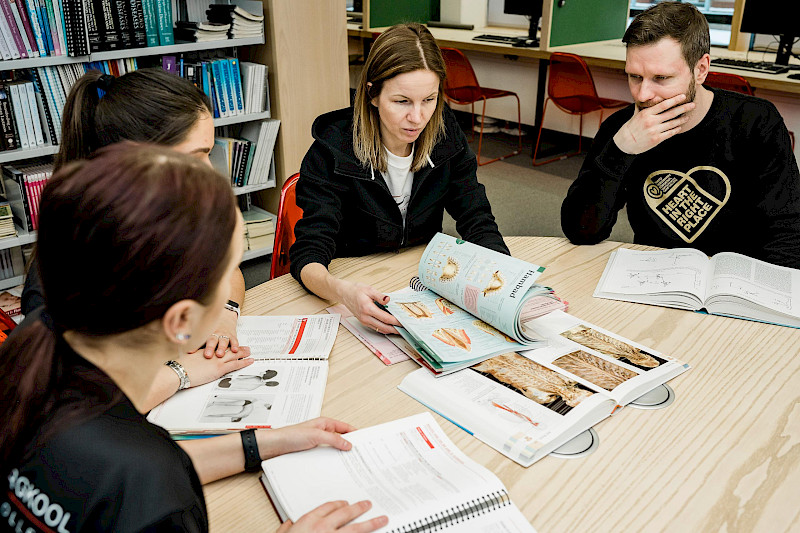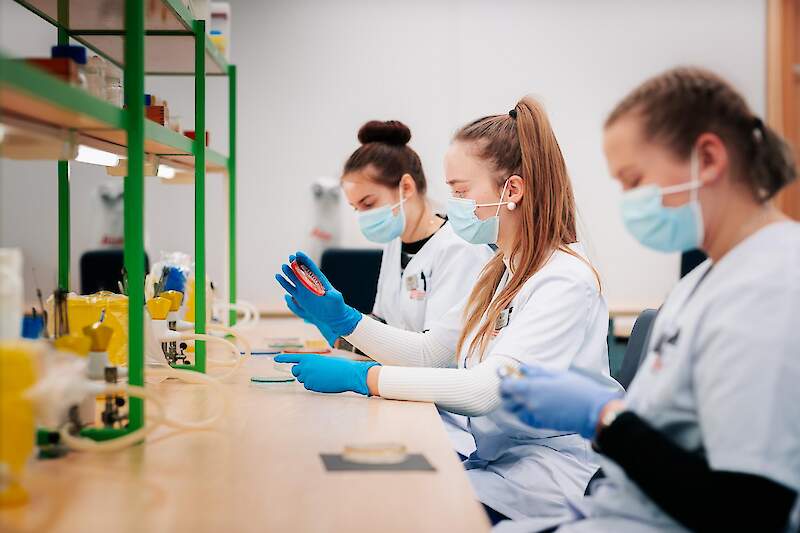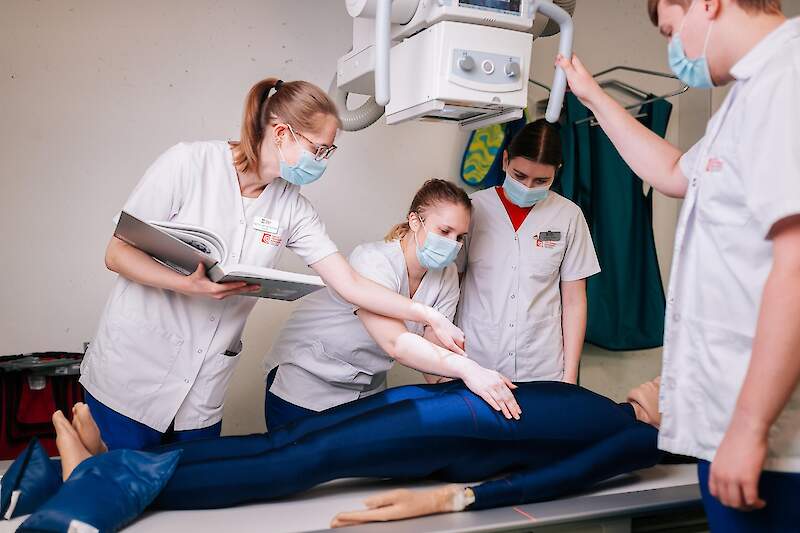- Schools
- Tartu Health Care Collage
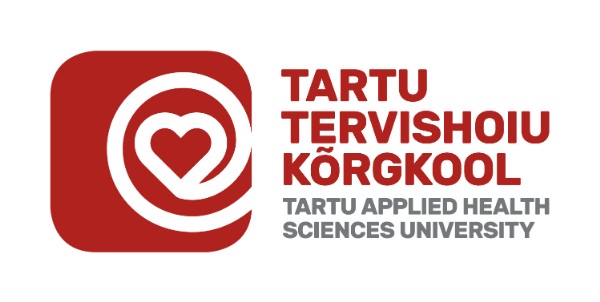
Come study at Tartu Health Care College
Tartu University of Health Sciences is committed to creating the best learning and teaching opportunities in the field of health care and to raising health awareness in society. We are a valued institution of higher education and a centre of excellence in health and well-being in Estonia and internationally. We offer 6 vocational education programmes, 6 applied higher education programmes and 6 master's programmes. There are both day and cycle study specialisations. In addition, we operate all over Estonia!
Find out more about our admission and admission conditions HERE
If you have any questions, feel free to chat with us and we will get back to you as soon as possible!
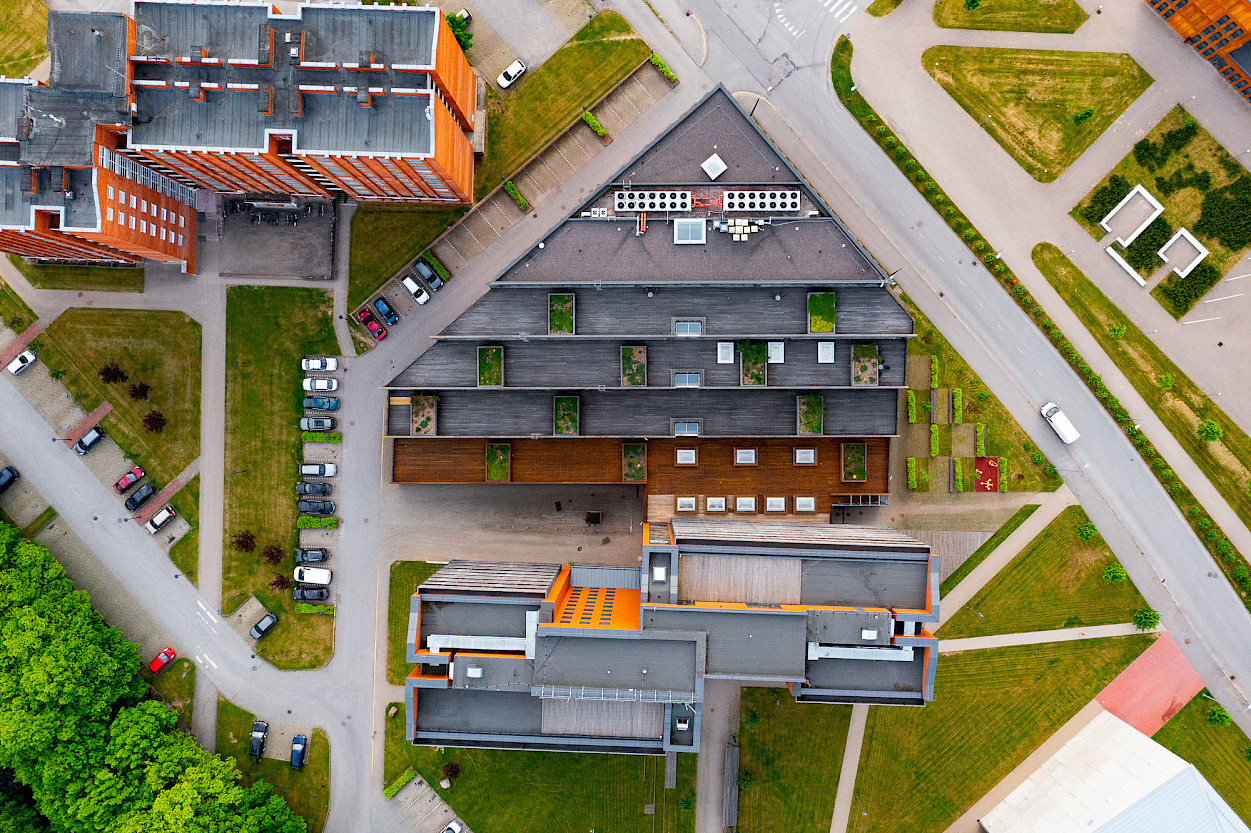
6 higher vocational education curricula
6 vocational education curricula
3 master's degree curricula
VOCATIONAL SPECIALISATIONS
Kutseõppesse saad tulla õppima kui oled omandanud keskhariduse.
SPECIALISATIONS IN HIGHER APPLIED EDUCATION
Rakenduskõrghariduse õppekavadele kandideerimiseks on vajalik teha akadeemiline test.
ÕDE
INTERNATIONAL MASTER'S PROGRAMS
Süda õige koha peal!
Tartu Tervishoiu Kõrgkool lähtub tegevustes neljast põhiväärtusest:
- PROFESSIONAALSUS
Väärtustame kvaliteeti, tõenduspõhisust, asjatundlikkust, läbipaistvust, akadeemilist vabadust ja koostööd. - ARENGULE SUUNATUS
Oleme õppimiskesksed, nutikad, ühiskonna vajadusi arvestavad, asjakohased ning uuenduslikud. - INIMKESKSUS
Hindame kõrgelt eetilisust, ausust, võrdsust, empaatiavõimet, individuaalset lähenemist ja kaasatust. - TERVISETEADLIKKUS
Oleme tervist toetavad, tervislikke eluviise väärtustavad ja terviseteadlikkust edendavad
Meie juures õppides on Sul süda alati õige koha peal!
MICROCRAFTS AT THE TARTU SCHOOL OF HEALTH SCIENCES
A micro-qualification or micro-credit is a longer, comprehensive programme of continuing education based on the subjects of a degree programme. The programme creates the opportunity for you to acquire an additional specialisation or to upgrade your professional competences in a narrow field.
The Tartu University of Health Sciences offers a wide range of microcourses for a variety of interests. It is a great opportunity to refresh or update your professional knowledge, make new contacts, improve your competitiveness in the labour market and make a change in your career. You will study alongside degree-level students, but the microcourses will be in a more specific field. So learning is flexible for you!
Examples of microcredits that have taken place:
- Physical hazards in the work environment
- Health care theory
- Mental health nursing theory
- Clinical nursing theory
- Basic knowledge and skills in clinical microbiology
- Quality management and leadership in health care
- Chemicals as hazards and toxicology
- Water quality
- Introduction to clinical chemistry and haematology
- Food safety
Check out the range of microcrafts at Tartu University of Health Sciences on our website!
TRAINING COURSES AT THE TARTU SCHOOL OF PUBLIC HEALTH
Tartu Health Care College offers and organises training courses for everyone who is interested in improving themselves and acquiring new knowledge!
Many of our trainers either have a long practical experience or are currently working in the healthcare field. This makes it easier for them to identify with the nature of the trainee's work and to enrich their training with real-life examples. As an applied higher education institution, a large and very important part of our training is the practical side, so that participants can practise the skills they need by doing it themselves.
If you or your organisation has an interest in a particular subject area, we can organise the training according to your needs and exactly the way you want it. For more information on the training courses we offer, please see our training calendar! Come and find out more!
Listen to why we have our hearts in the right place
Frequently asked questions
Reception is open from 12 June to 26 June. More information and dates are also available on the website!
An academic test is required for all programmes of higher education in applied sciences. If you haven't already done so, you can apply for it in SAIS when you submit your application. The summer academic test will take place on 1 July! Read more and see the sample questions on the website.
Interviews will be held for all programmes (except physiotherapy). Interviews will take place between 28 June and 12 July.
For the Physiotherapist programme, in addition to the academic test, a physical test is required, which will take place between 4-5 June. read more on the website.
To apply for vocational training, you need to have completed secondary education!
Applications for VET courses can be submitted in SAIS from 12 June to 31 July!
Applications for the massage and podiatry courses are based on the average grade of the secondary school leaving certificate.
Applications for care worker, emergency medical technician, child minder and activity supervisor will be based on the average grade of the secondary school leaving certificate (50%) as well as the results of the interview (50%). The interviews will take place from 5th to 9th grade. august! Read more on the website.
The aim of the academic test is to assess your readiness for university studies. The test questions do not test the knowledge acquired at secondary school level, but test the ability to make logical connections and to use the information given. Academic tests are problem-based, i.e. you have to answer a set question on the basis of given information. Tasks may involve finding information from diagrams, tables, maps, understanding regularities in three-dimensional and planar shapes, understanding text and vocabulary, and solving mathematical problems. The test will consist of 35-45 multiple-choice questions and will take 60 minutes to complete. Anyone wishing to do so will be able to consult the sample questions.
No. If you meet the admission requirements, you're welcome!
Olulised kuupäevad
- Juhul kui sinu õppekaval on vajalik sooritada akadeemiline test, siis registreeri akadeemilisele testile SAIS-is 16. juuni kuni 1. juuli.
- 16. juuni algab vastuvõtt kõrgharidusõppesse ja kutseõppesse
- Suvine akadeemiline test toimub 7. juuli, vajalik eelnev registreerimine SAIS-is.
- Rakenduskõrgariduse õppekavadel lõppeb avalduste vastuvõtt 1. juuli. Kutseõppe õppekavadel lõppeb avalduste vastuvõtt 31. juuli.
- Vastuvõtuvestlused tervisekaitse, radioloogiatehniku, õe, ämmaemanda ja bioanalüütiku õppekavedel toimuvad 10.-16. juulini.
- 10.-11. juuli toimuvad kehalised katsed ainult füsioterapeudi õppekavale kandideerinutele.
- Rakenduskõrghariduse õppekavade nimekirjad tehakse avalikuks hiljemalt 21. juuli.
- Kutseõppe kandideerinute vestlused toimuvad 4.-8. august. Nimekirjad avalikustatakse hiljemalt 11. august.
Õppeaasta algab 1. septembril avaaktusega! Tere tulemast!




